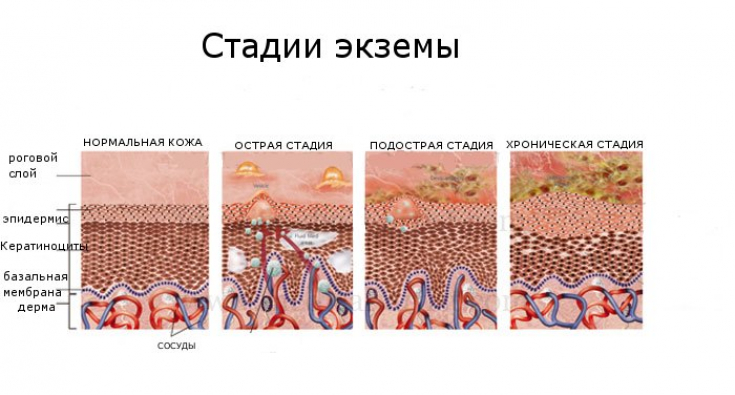Atopic eczema, also known as atopic dermatitis or neurodermatitis, is a chronic inflammatory skin disease that can be accompanied by frequent spontaneous exacerbations and remissions. It is a heterogeneous, highly variable skin disease with a wide range of manifestations, which is characterized mainly by dry skin, severe itching and inflammatory skin lesions.
Atopy is associated with increased levels of immunoglobulin E (IgE) antibodies against common inhaled allergens (sensitization), but there does not appear to be an absolute relationship between IgE levels and atopic dermatitis, nor does the percentage of people with atopic dermatitis exhibit allergic sensitization to aeroallergens, varies widely from 30% to 80%. The development of atopic eczema followed by the development of allergic sensitization, asthma, or food allergy is often referred to as the "atopic march", but this is not a universal phenomenon.
Read more about the results of a Cochrane systematic review of 77 studies (6603 participants, mean age: 18.6 years) on the effectiveness of various approaches to the treatment of eczema in the estet-portal.com article.
Evidence-based medicine: what is really effective
Moisturizer use reduced atopic dermatitis (SCORAD) scores compared to placebo (3 studies, 276 participants). Moisturizer use resulted in fewer relapses (2 studies, 87 participants), increased duration of remission (180 versus 30 days), and reduced need for topical corticosteroids (2 studies, 222 participants). There was no clear difference in terms of side effects (1 study, 173 participants). The evidence for these results was of low quality.
Atopic dermatitis in adults: causes, symptoms and treatment
Participants reported improved skin condition after using a urea cream compared to placebo (1 study, 129 participants; low-quality evidence). Urea cream reduced dryness (1 study, 128 participants; moderate-quality evidence) and relapses (1 study, 44 participants; low-quality evidence), but caused more adverse events (1 study, 129 participants; moderate-quality evidence).
Three studies evaluated glycerol cream versus placebo. More participants in the glycerol group reported improvements in skin condition (1 study, 134 participants; moderate-quality evidence), which also included improved SCORAD scores (1 study, 249 participants; high-quality evidence). The number of side effects reported was not statistically significant (moderate-quality evidence).

Four studies have compared oatmeal creams with placebo. There were no significant differences between groups in disease severity (1 study, 50 participants; low-quality evidence), patient satisfaction (1 study, 50 participants; very-low-quality evidence). The oats group had fewer relapses (1 study, 43 participants; low-quality evidence) and reduced use of topical corticosteroids (2 studies, 222 participants; low-quality evidence), but more adverse events (1 study, 173 participants; low-quality evidence).
Watch the most interesting videos on our channel in Youtube
Effective management of eczema
Most moisturizers have shown some beneficial effects: prolonging remission, reducing the number of relapses and the amount of corticosteroids required.
Eczema management includes treatments for active inflammatory lesions, management strategies to minimize triggers, lifestyle modification and eczema education, and complementary therapies to optimize skin barrier function and prevent flare-ups.
The use of moisturizers has always been an integral part of the treatment of eczema.
Thank you for staying with estet-portal.com. Read other interesting articles in the "Dermatology" section. You may be interested in When the skin "boils": features of the diagnosis and treatment of true eczema







Add a comment